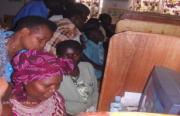Power to the (rural) People!
In my recent interviews with telecoms, NGOs, and governments working in Africa I’ve noticed a common theme. In a very generalized sense, Internet infrastructure is in place (or under construction) in urban centers throughout Sub-Saharan Africa. Even in places where connectivity is still lacking, like in South Sudan and Somalia, initiatives are underway to light up those nations. I think it is appropriate to say that this stage of communication development, which I will call connectivity 1.0, has the necessary foundation for completion.
Connectivity 2.0, then, is focused on rural Africa. Specifically, it entails:
(1) how to bring connectivity to rural areas in financially sustainable ways
(2) how to make the Internet and mobiles useful and relevant tools for rural lifestyle
Others in the ICT4D space have recognized this need as well. Infodev’s Program Manager Valerie D’Costa recently spoke on the urgent need to use ICTs especially for rural development projects. One of the ITU’s new flagship initiatives is to bring ICTs to rural schools and villages. And USAID leaders repeatedly emphasize the power of mobile phones for agricultural development in rural areas.
SANGONeT, an umbrella NGO specializing in ICT expertise and agricultural development, is taking advantage of this momentum, and is planning an upcoming conference in South Africa on ICT4RD (ICT for rural development), slated for November 1-3, 2011. The South African Departments of Communication and Rural Development, the Gates Foundation, Cisco, Microsoft, and InfoDev are sponsoring the conference. They hope to attract national USFs in Sub-Saharan Africa, NGOs, and telecom companies.
The collaboration between these entities is vital to creating sustainable solutions, SANGONeT Program Manager Matthew de Gale explains. With commitments from government USFs in Zambia, Uganda, and South Africa to attend, de Gale hopes that additional USFs and international organizations like USAID and the World Bank will also send representatives, helping African governments to make the most informed policy decisions regarding rural development. Hopefully, then, policymakers will meet the challenges posed by connectivity 2.0.








































